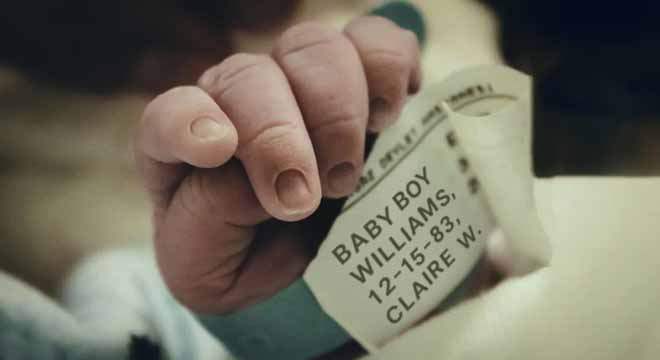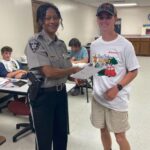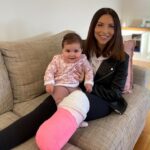between my mother and me had frayed. With her Alzheimer’s erasing pieces of her every day, it felt as if I were navigating a maze of memories that weren’t entirely mine. The decision to place her in a care facility weighed on me like a lead blanket.
I wasn’t equipped to give her the care she needed, but the guilt gnawed at me all the same.
Packing up her belongings was part of the process, though it felt more like dismantling her life piece by piece. I climbed the narrow steps to the attic and knelt by the nearest box, brushing away cobwebs before opening.
I expected the usual: old photo albums or yellowed papers she hadn’t used in years. Instead, my hand froze as I pulled out a small, yellowed hospital bracelet.
The text on it blurred as I reread the name over and over:
“Baby Boy Williams, 12-15-83, Claire W.”
My fingers trembled as I reached back into the box. There was a delicate baby blanket with the initials “C.W.” stitched into one corner. Beneath it was a black-and-white photo of my mother holding a baby. She looked impossibly young, her face glowing with love.
The back read: “My Collin, Winter 1983.”
I stared at the photo.
Collin? Who are you? My brother? And where are you now?
I brought the bracelet and photo downstairs, holding them so tightly my knuckles turned white. My mother was in her favorite armchair, her frail frame almost swallowed by the oversized cushions. She stared out the window, her expression serene. To anyone else, she might have looked calm, at peace even. But I knew better. That stillness masked the fog of Alzheimer’s, the disease that had stolen so much of her mind.
“Mom,” I said softly, walking over and kneeling beside her. “I need to ask you something.” I placed the bracelet and photo on her lap, watching her eyes flicker toward them. For a brief moment, I thought I saw recognition in her gaze, but it passed as quickly as it came.
Her fingers brushed over the photo, and she muttered something under her breath. “Sunlight… warm… chocolate cake,” she said, her words drifting into nonsense. “The flowers were so pretty that day.”
I felt my chest tighten. “Mom, please,” I urged, trying to keep the frustration out of my voice. “Who is Collin? Why didn’t you ever tell me about him?”
She didn’t answer. Instead, she rambled about a cat we never owned and a picnic that may or may not have happened. My hope started to crumble.
I sank onto the floor beside her, exhausted. The bracelet and photo were still on her lap, untouched. I closed my eyes for a moment, trying to steady myself. Then, she spoke again, her voice clear and soft, like a distant echo of the mother I used to know.
“It was a winter morning,” she began, her gaze fixed on something I couldn’t see. “The sun was shining through the window. I named him Collin.”
My breath caught. I stayed silent, afraid to break whatever fragile thread had surfaced in her memory.
“He was beautiful,” she whispered. “But his father took him away. Said it was for the best.”
Her words hit me like a wave. “His father?” I whispered. “Who is he? Why did he take Collin?”
Before I could ask more, her clarity slipped away. Her eyes clouded, and she began repeating, “The Bread Basket… The Bread Basket…”
“What does that mean, Mom?” I pressed gently, but she only repeated it like a mantra.
I couldn’t stop thinking about Collin. I decided to go to the hospital where I was born, the only one in the city. My mother’s memory was unreliable, but being in a familiar place could trigger something.
“We’re going to the hospital where Collin was born,” I told her as I helped her into the car.
She looked at me, her expression distant. “Hospital? Why?”
“You mentioned Collin before, remember? I need to know more about him.”
Her hands fidgeted in her lap. “Collin… I don’t know if I remember.”
“It’s okay,” I said, trying to sound reassuring. “Maybe being there will help.”
The drive was quiet, apart from her occasional murmurs.
“Sunlight… winter mornings,” she whispered, staring out the window. “He had the softest blanket…”
When we arrived, the hospital looked just as I remembered it from my childhood—small, with its faded brick exterior and slightly overgrown bushes by the entrance. I helped Mom out of the car, and her eyes scanned the building as though trying to place it.
Inside, I explained our visit to the receptionist, who directed us to Dr. Miller, the head doctor.
“Dr. Miller,” I began, once we were seated in her office, “I found this bracelet and photo. My mother… She had a son, Collin, two years before me. I need to know what happened.”
Dr. Miller examined the bracelet and photo, her expression softening.
“I remember Claire,” she said, looking at my mother. “She was so young when she had Collin.”
My mother shifted uncomfortably in her chair but said nothing.
“What happened to him?” I asked, leaning forward.
Dr. Miller sighed. “Collin’s father came back into the picture after he was born, much older than Clarie. He wasn’t her boyfriend at the time, but someone from her past. He wanted to raise the baby himself.”
My mother’s head turned slightly, her eyes narrowing as if trying to follow the conversation.
“Claire was devastated,” Dr. Miller continued. “She loved Collin, but the boy’s father took Collin when he was just a few months old. He wrote to me for a while, asking for advice on caring for Collin. Then the letters stopped.
“What town?” I asked quickly.
Dr. Miller jotted it down on a piece of paper and handed it to me. “Here. It’s about five hours from here.”


